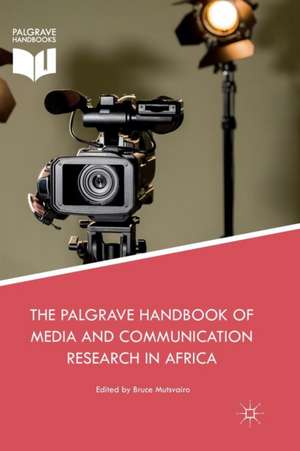The Palgrave Handbook of Media and Communication Research in Africa
Editat de Bruce Mutsvairoen Limba Engleză Paperback – 14 ian 2019
This handbook attempts to fill the gap in empirical scholarship of media and communication research in Africa, from an Africanist perspective. The collection draws on expert knowledge of key media and communication scholars in Africa and the diaspora, offering a counter-narrative to existing Western and Eurocentric discourses of knowledge-production. As the decolonial turn takes centre stage across Africa, this collection further rethinks media and communication research in a post-colonial setting and provides empirical evidence as to why some of the methods conceptualised in Europe will not work in Africa. The result is a thorough appraisal of the current threats, challenges and opportunities facing the discipline on the continent.
| Toate formatele și edițiile | Preț | Express |
|---|---|---|
| Paperback (1) | 1554.41 lei 6-8 săpt. | |
| Springer International Publishing – 14 ian 2019 | 1554.41 lei 6-8 săpt. | |
| Hardback (1) | 1560.73 lei 6-8 săpt. | |
| Springer International Publishing – 4 apr 2018 | 1560.73 lei 6-8 săpt. |
Preț: 1554.41 lei
Preț vechi: 1895.62 lei
-18% Nou
Puncte Express: 2332
Preț estimativ în valută:
297.49€ • 309.76$ • 251.41£
297.49€ • 309.76$ • 251.41£
Carte tipărită la comandă
Livrare economică 11-25 martie
Preluare comenzi: 021 569.72.76
Specificații
ISBN-13: 9783030099596
ISBN-10: 3030099598
Ilustrații: XXIX, 497 p. 3 illus.
Dimensiuni: 155 x 235 mm
Greutate: 0.73 kg
Ediția:Softcover reprint of the original 1st ed. 2018
Editura: Springer International Publishing
Colecția Palgrave Macmillan
Locul publicării:Cham, Switzerland
ISBN-10: 3030099598
Ilustrații: XXIX, 497 p. 3 illus.
Dimensiuni: 155 x 235 mm
Greutate: 0.73 kg
Ediția:Softcover reprint of the original 1st ed. 2018
Editura: Springer International Publishing
Colecția Palgrave Macmillan
Locul publicării:Cham, Switzerland
Cuprins
Part I: Media and Communication Studies in Decolonial, Postcolonial and Protest contexts.- 1. If I were a Carpenter: Reframing debates in Media and Communication Research in Africa, Bruce Mutsvairo.- 2. Can the subaltern think? The Decolonial turn in Communication Research in Africa, Last Moyo and Bruce Mutsvairo.- 3. Decolonising Communication & Media Studies Research: a Smash-and-Grabber’s Guide, Colin Chasi.- 4. Decolonising Communication Studies: Advancing the discipline through fermenting participation studies, Colin Chasi and Ylva Rodny-Gumede.- 5. Decolonization and Postcoloniality: The Challenges at Stake in Media and Communication Research in Francophone Africa, Christian Agbobli and Marie Soleil Frere.- 6. Researching and Teaching African Media Studies from the “Centre”: Challenges and Opportunities for Epistemic Resistance, Toussant Nothias.- 7. “An-Other thinking” 1 Film theory: Film Studies and Decolonisation in Africa, Beschara Karam.- Part II: Conceptualizing and Contextualizing: Lessons and Limitations.- 8.The Four-leafed Clover: Political Economy as a Method of Analysis, Ruth Teer-Tommaselli.- 9. The Southern African Spy machine: Emerging Research on Communications Surveillance and Resistance in the Region, Jane Duncan.- 10. Bridging Critical and Administrative Research Paradigms in the Interest of a Politically Engaged African Research Agenda, Ylva Rodny-Gumede.- 11.Comparative Media Studies in Africa: Challenges and Paradoxes, Susana Salgado.- 12. The Social is Political: Media, Protest and Change as a challenge to African media research, Herman Wasserman.- 13. Mobile Phone Communication in the Mobile Margins of Africa: The ‘Communication Revolution’ Evaluated from Below, Mirjam de Bruijn and Inge Brinkman.- Part III: Cross-disciplinary Approaches in the Digital Age.- 14. “The Devil is in the Rumba Text.” Commenting on Digital Depth, Katrien Pype.- 15. Technopolitics and New Media in Africa, Iginio Gagliardone.- 16. Interrogating the Culture of Exclusion in the Diasporic Media activity, Everette Ndlovu.- 17. Law and Innovation in the Somali Territories, Nicole Stremlau.- Part IV New and Old Media: Perspectives, Methodologies, Developments and Ethics.- 18. Terrorists’ Social Media Messages: A Critical Analysis of Boko Haram’s Message and Messaging Techniques, Chris Wolumati Ogbondah and Pita Agbese Ogaba.- 19. Gender Perspectives in Media and Communications Studies in Africa, Kristin Skare Orgeret.- 20. Mono-method research approach and scholar-policy disengagement in Nigerian communication research, Ayobami Ojebode, Babatunde Raphael Ojebuyi, Oyewole Adekunle Oladapo and Obasanjo Joseph Oyedele.- 21. Ubuntu and the communication-power nexus, Leyla Haidarian-Tavernaro.- 22. Questioning the Role of Foreign Aid in Media System Research, Suzanne Harris.- 23. Rethinking Media Research in Africa, Tanja Bosch.- 24. This Hard Place and That Hard Terrain: Zimbabweans Doing Media and Cultural Studies On or In Zimbabwe Since the mid 1990, Nhamo Mhiripiri.- 25. BBC and African audience: Insights from ethnography, Muhammed Musa.- 26. For the Attention of African Media Scholars: An Introduction to Critical Discourse Analysis, Muhammad Jameel Yusha'u.
Notă biografică
Bruce Mutsvairo is Associate Professor in Journalism Innovation at the University of Technology Sydney, Australia.
Textul de pe ultima copertă
This handbook attempts to fill the gap in empirical scholarship of media and communication research in Africa, from an Africanist perspective. The collection draws on expert knowledge of key media and communication scholars in Africa and the diaspora, offering a counter-narrative to existing Western and Eurocentric discourses of knowledge-production. As the decolonial turn takes centre stage across Africa, this collection further rethinks media and communication research in a post-colonial setting and provides empirical evidence as to why some of the methods conceptualised in Europe will not work in Africa. The result is a thorough appraisal of the current threats, challenges and opportunities facing the discipline on the continent.
Caracteristici
Brings together leading scholars from across the continent
Offers a counter-narrative to the methodological and theoretical approaches adopted from the West in the African context
Challenges some of the widely held notions and stereotypes about media and communication research in Africa
Offers a counter-narrative to the methodological and theoretical approaches adopted from the West in the African context
Challenges some of the widely held notions and stereotypes about media and communication research in Africa
